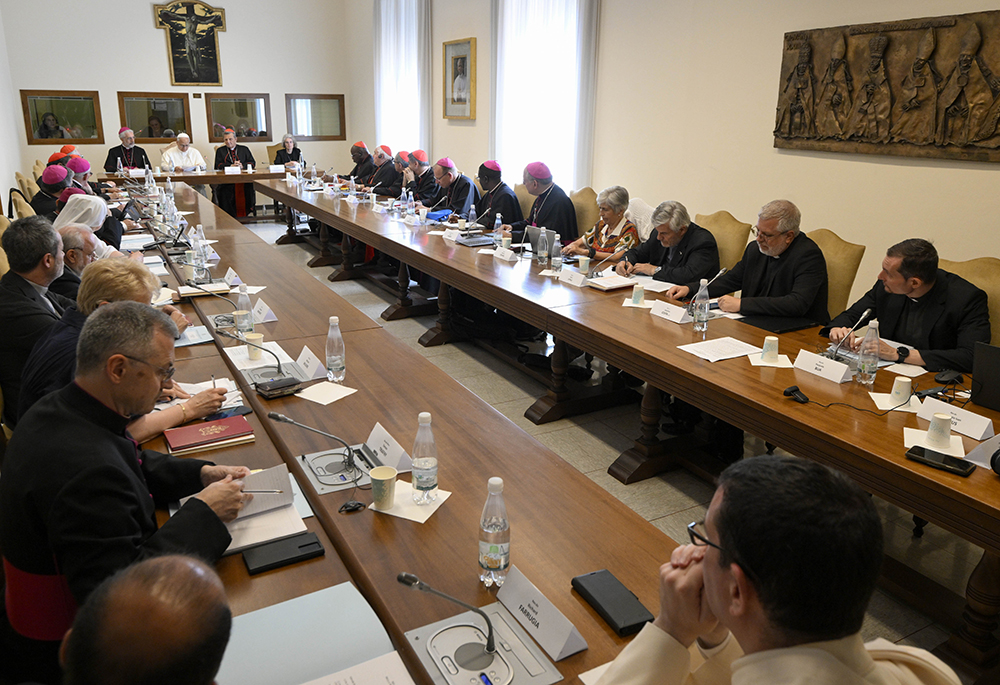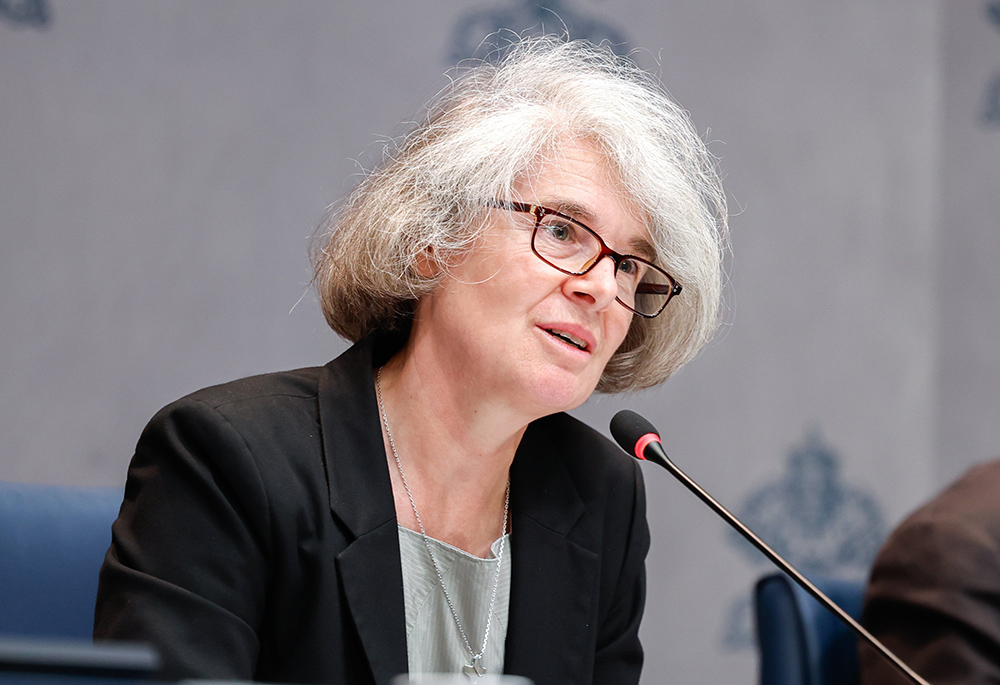
Pope Leo XIV addresses the Ordinary Council of the General Secretariat of the Synod during a meeting at the Vatican on June 26, 2025. (CNS/Vatican Media)
The Vatican released a new document July 7, "Pathways for the Implementation Phase of the Synod," which aims to guide the church in the next few years as it digests the works of the twin synods on synodality. Issued by the General Secretariat of the Synod, the text is a kind of map for the local churches in preparation for the 2028 ecclesial assembly that will focus on this key reform effort begun by Pope Francis and continued now by Pope Leo XIV.
The document makes clear at the very beginning that synodality is intended to help the church better embrace its own missions of evangelization. "The synodal form of the Church is at the service of its mission, and any change in the life of the Church is intended to make it more capable of proclaiming the Kingdom of God and witnessing to the Gospel of the Lord to the men and women of our time."
How to proclaim the kingdom of God is not a new issue. The First Letter of John is focused squarely on how the proclamation of the Gospel is linked to vital issues of ecclesial identity and moral witness. "Now this is the message that we have heard from him and proclaim to you: God is light, and in him there is no darkness at all," the apostle writes. "If we say, 'We have fellowship with him,' while we continue to walk in darkness, we lie and do not act in truth. But if we walk in the light as he is in the light, then we have fellowship with one another, and the blood of his Son Jesus cleanses us from all sin" (1 John 1:5-7).
Just as the apostle John starts with the revelation of God and consideration of who God is, before drawing out the social ("fellowship") and moral ("walk in darkness") consequences, the church, especially in Western, post-industrialized societies, needs to find a way to resist the temptation to reduce religion to its social and ethical teachings. Those teachings are rooted in the kerygma, the proclamation of the Gospel, not the other way round. Young churches and those in Catholic cultures do not reduce religion to ethics the way we Americans do.
If our moral teachings are divorced from their dogmatic roots, they must stand on their own. And they can't. As is obvious from even the most cursory examination of the divisions within American Catholicism today, some Catholics embrace the church's sexual ethics but dismiss its social ethics. Others warm to the social ethics but dismiss the sexual ethics. Both ethics are too countercultural to stand on their own in our secular culture, but they were never intended to stand alone. We must relearn how and why those ethics are rooted in the Gospel and in our foundational, creedal beliefs.
Add in the fact that ours is a consumer society, in which we raise our children to believe they get to choose everything about their lives, and preaching a Gospel that makes insistent and invasive demands upon the life of its followers is not so easy.
Synodality can and should help the church in the U.S. be more fully itself and, just so, less fractious and polarized. Efforts to overcome polarization are often stillborn because they come at the issue head-on, and people dig in. By focusing on the mission of the church, evangelization, we may better overcome that polarization when we start listening to, and learning from, one another.

Xavière Missionary Sr. Nathalie Becquart, undersecretary of the Synod of Bishops, speaks at an Oct. 21, 2024, press briefing about the Synod of Bishops at the Vatican. (CNS/Lola Gomez)
The new document acknowledges the energy and enthusiasm experienced by those who have already engaged in the synodal process but it invites all of us to move forward. Unlike the consultations before the twin synods, we now have the final document they produced and which is now part of the ordinary magisterium of the church. The new document specifically calls on local churches to listen to "those who have expressed doubts and resistance to the synodal process: in order to truly walk together, we cannot lose the contribution of their point of view."
To those who fret that synodality will upend the hierarchic structure of the church, the new document makes clear that synodality promotes co-responsibility within that structure, not apart from it. "Precisely because this is an ecclesial process in the fullest sense of the term, the first person responsible for the implementation phase in each local Church is the diocesan or eparchial Bishop: it is his responsibility to initiate it, officially indicate its duration, methods and objectives, accompany its progress and conclude it, validating its results," the document states.
Advertisement
The document also calls for increased collaboration between and among the local churches. "In our highly connected society, no Diocese or Eparchy can think of living in isolation, without being affected, for better or for worse, by what happens in other places," it states. It notes that there are both formal and informal structures in place to facilitate this collaboration. The section on "Preserving the overall vision" provides concrete ideas about implementing the final document of the 2024 synod. The process is open to new ideas, to be sure, but it is the final document, the fruit of the synodal process to date, that is being implemented.
The North Star for synodality is that it is a part of the reception of the Second Vatican Council. "I often quote an Australian theologian who was at our synod, Ormond Rush, who states, 'Synodality is the Second Vatican Council in a nutshell.' And all our documents, and still in these pathways, in the Final Document, highlight that what we are doing is really referred to the vision of the Second Vatican Council," Sr. Nathalie Becquart, undersecretary of the General Secretariat of the Synod, explained in an interview. "We can say synodality is the way to understand the ecclesiology of the Second Vatican Council in this stage of the reception of the Council."
Large changes in big institutions do not happen on a dime. When they do, things go awry. Think of Elon Musk's DOGE experiment. This new document is, like many synodal texts, bureaucratic and methodical. Still, it is obvious from reading it, and from speaking with those who have participated in synodal processes, at the local, continental or global levels, that synodality is not just about harnessing the gifts of the Spirit. It is a gift of the Spirit.





